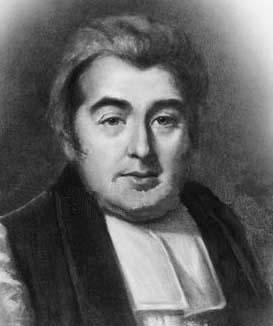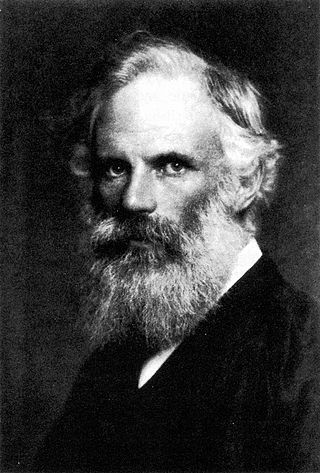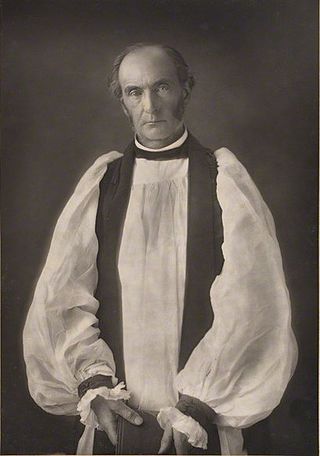
John Mortimer Brinkley was the first Royal Astronomer of Ireland and later Bishop of Cloyne. He was President of the Royal Irish Academy (1822–35), President of the Royal Astronomical Society (1831–33). He was awarded the Cunningham Medal in 1818, and the Copley Medal in 1824.

Prof George Francis FitzGeraldFTCD was an Irish academic and physicist who served as Erasmus Smith's Professor of Natural and Experimental Philosophy at Trinity College Dublin (TCD) from 1881 to 1901.

William Conyngham Plunket, 4th Baron Plunket was Dean of Christ Church Cathedral and Archbishop of Dublin in the Church of Ireland.

James Clarence Mangan, born James Mangan, was an Irish poet. He freely translated works from German, Turkish, Persian, Arabic, and Irish, with his translations of Goethe gaining special interest. Starting around 1840, and with increasing frequency after the Great Famine began, he wrote patriotic poems, such as A Vision of Connaught in the Thirteenth Century. Mangan was troubled, eccentric, and an alcoholic. He died early from cholera, amid the continuing dire conditions of the Famine. After his death, Mangan was hailed as Ireland's first national poet and admired by writers such as James Joyce and William Butler Yeats.

Sir Robert John Kane was an Irish chemist and educator.
Richard Graves (1763–1829) was a Church of Ireland cleric, theological scholar and author of Graves on the Pentateuch. He was a Doctor of Divinity, one of the seven Senior Fellows of Trinity College, Dublin; a member of the Royal Irish Academy; Regius Professor of Greek (Dublin); and Dean of Ardagh. He was the younger brother of Thomas Ryder Graves, Dean of Ardfert and Connor.
John Ryder was the Church of Ireland Bishop of Down and Connor, from 1743 to 1752, and then Archbishop of Tuam, from 1752 to his death in 1775.

Franc Sadleir [formerly Francis] (1775–1851) was an Irish academic and Provost of Trinity College Dublin from 1837.

James Henthorn Todd was a biblical scholar, educator, and Irish historian. He is noted for his efforts to place religious disagreements on a rational historical footing, for his advocacy of a liberal form of Protestantism, and for his endeavors as an educator, librarian, and scholar in Irish history.

Henry Ussher was an Irish Protestant churchman, a founder of Trinity College Dublin, and Church of Ireland Archbishop of Armagh.
John Gregg was an Anglican bishop.

Thomas Elrington was an Irish academic and bishop. He was Donegall Lecturer in Mathematics (1790-1795) at Trinity College Dublin (TCD). While at TCD he also served as Erasmus Smith's Professor of Mathematics (1795–1799) and as Erasmus Smith's Professor of Natural and Experimental Philosophy (1799–1807). Later, he was Provost of Trinity College Dublin (1811-1820), then Bishop of Limerick, Ardfert and Aghadoe (1820-1822), and finally Bishop of Ferns and Leighlin till his death in Liverpool in 1835.
George Hall was an academic at Trinity College Dublin, who served as the fourth Erasmus Smith's Professor of Mathematics from 1799 to 1800, as Provost of the college from 1806 to 1811, and the Church of Ireland Bishop of Dromore for a few days before his death in 1811.

Hugh Hamilton was a mathematician, natural philosopher (scientist) and professor at Trinity College Dublin, and later a Church of Ireland bishop, Bishop of Clonfert and Kilmacduagh and then Bishop of Ossory.
Henry Jones was the Anglican Bishop of Clogher and Bishop of Meath.

John Sterne (1660–1745) was an Irish Church of Ireland clergyman, bishop of Dromore from 1713 and then bishop of Clogher from 1717.

Bartholomew Lloyd (1772–1837) was an Irish mathematician and academic whose entire career was spent at Trinity College Dublin. As Erasmus Smith's Professor of Mathematics there, he promoted significant curricular reforms, including the introduction of the teaching of calculus. Later he served as Provost of the college.
William Urwick the younger (1826–1905) was an Anglo-Irish nonconformist minister and antiquarian chronicler.
John Ryder was an Irish Anglican priest in the 18th-century.
Edward Goldmith (1662–1722) was an Irish Anglican priest in the 17th century.
This page is based on this
Wikipedia article Text is available under the
CC BY-SA 4.0 license; additional terms may apply.
Images, videos and audio are available under their respective licenses.











